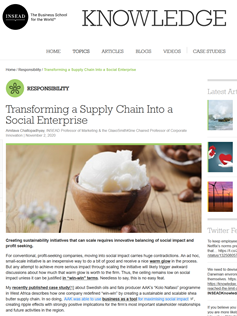Transforming a Supply Chain Into a Social Enterprise

For conventional, profit-seeking companies, moving into social impact carries huge contradictions. An ad hoc, small-scale initiative is an inexpensive way to do a bit of good and receive a nice warm glow in the process. But any attempt to achieve more serious impact through scaling the initiative will likely trigger awkward discussions about how much that warm glow is worth to the firm. Thus, the ceiling remains low on social impact unless it can be justified in “win-win” terms. Needless to say, this is no easy feat.
My recently published case study[1] about Swedish oils and fats producer AAK’s “Kolo Nafaso” programme in West Africa describes how one company redefined “win-win” by creating a sustainable and scalable shea butter supply chain. In so doing, AAK was able to use business as a tool for maximising social impact, creating ripple effects with strongly positive implications for the firm’s most important stakeholder relationships and future activities in the region.

Read On

